前面学习了 Spring Security 入门,现在搭配 oauth2 + JWT 进行测试。
OAuth 是一个关于授权(authorization)的开放网络标准,使得第三方应用可以使用该令牌在限定时间、限定范围访问指定资源。在全世界得到广泛应用,目前的版本是2.0版。
resource owner: 拥有被访问资源的用户user-agent: 一般来说就是浏览器client: 第三方应用Authorization server: 认证服务器,用来进行用户认证并颁发tokenResource server:资源服务器,拥有被访问资源的服务器,需要通过token来确定是否有权限访问明确概念后,就可以看 OAuth2 的协议握手流程,摘自RFC6749
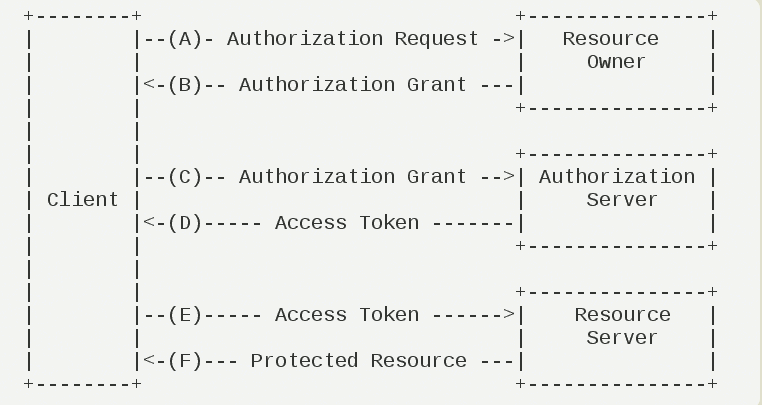
(A)用户打开客户端以后,客户端要求用户给予授权。
(B)用户同意给予客户端授权。
(C)客户端使用上一步获得的授权,向认证服务器申请令牌。
(D)认证服务器对客户端进行认证以后,确认无误,同意发放令牌。
(E)客户端使用令牌,向资源服务器申请获取资源。
(F)资源服务器确认令牌无误,同意向客户端开放资源
oauth2根据使用场景不同,分成了4种模式
授权码模式使用到了回调地址,是最为复杂的方式,通常网站中经常出现的微博,qq第三方登录,都会采用这个形式。简化模式不常用。
使用oauth2保护你的应用,可以分为简易的分为三个步骤
这里直接引入 spring-cloud oauth2,更加方便之后的拓展。
<!--spring boot-->
<parent>
<groupId>org.springframework.boot</groupId>
<artifactId>spring-boot-starter-parent</artifactId>
<version>2.2.13.RELEASE</version>
<relativePath/> <!-- lookup parent from repository -->
</parent>
<dependencies>
<!--spring cloud oauth2-->
<dependency>
<groupId>org.springframework.cloud</groupId>
<artifactId>spring-cloud-starter-oauth2</artifactId>
</dependency>
<!--spring cloud security-->
<dependency>
<groupId>org.springframework.cloud</groupId>
<artifactId>spring-cloud-starter-security</artifactId>
</dependency>
<!--JWT-->
<dependency>
<groupId>io.jsonwebtoken</groupId>
<artifactId>jjwt</artifactId>
<version>0.9.1</version>
</dependency>
</dependencies>
<!--spring cloud-->
<dependencyManagement>
<dependencies>
<dependency>
<groupId>org.springframework.cloud</groupId>
<artifactId>spring-cloud-dependencies</artifactId>
<version>Greenwich.SR2</version>
<type>pom</type>
<scope>import</scope>
</dependency>
</dependencies>
</dependencyManagement>
这里需要进行访问客户端的配置,并配置授权类型和access_token转jwtToken。
@Configuration
@EnableAuthorizationServer
public class AuthorizationServerConfig extends AuthorizationServerConfigurerAdapter {
@Autowired
private BCryptPasswordEncoder bCryptPasswordEncoder;
@Autowired
private AuthenticationManager authenticationManager;
@Autowired
private UserDetailServiceImpl userDetailService;
@Autowired
@Qualifier("jwtTokenStore")
private TokenStore tokenStore;
@Autowired
private JwtAccessTokenConverter jwtAccessTokenConverter;
@Autowired
private JwtTokenEnhancer jwtTokenEnhancer;
/**
* 配置授权类型
*
* @param endpoints
* @throws Exception
*/
@Override
public void configure(AuthorizationServerEndpointsConfigurer endpoints) throws Exception {
//设置Jwt内容增强
TokenEnhancerChain tokenEnhancerChain = new TokenEnhancerChain();
List<TokenEnhancer> list = new ArrayList<>();
list.add(jwtTokenEnhancer);
list.add(jwtAccessTokenConverter);
tokenEnhancerChain.setTokenEnhancers(list);
endpoints
//密码模式必须配置
.authenticationManager(authenticationManager)
//密码模式必须配置
.userDetailsService(userDetailService)
//accessToken转JwtToken
.tokenStore(tokenStore)
.accessTokenConverter(jwtAccessTokenConverter)
//jwt内容增强
.tokenEnhancer(tokenEnhancerChain);
}
/**
* 配置客户端详情信息
*
* @param clients
* @throws Exception
*/
@Override
public void configure(ClientDetailsServiceConfigurer clients) throws Exception {
clients.
//基于内存配置
inMemory()
//客户端ID
.withClient("client")
//密钥
.secret(bCryptPasswordEncoder.encode("112233"))
//重定向地址
.redirectUris("http://www.baidu.com")
//授权范围
.scopes("all")
//accessToken有效时间
.accessTokenValiditySeconds(60)
//refreshToken有效时间
.refreshTokenValiditySeconds(3600)
/**
* 授权类型
* authorization_code:授权码模式
* password:密码模式
* refresh_token:刷新令牌
*/
.authorizedGrantTypes("authorization_code", "password", "refresh_token");
}
}
继承 ResourceServerConfigurerAdapter并添加 @EnableResourceServer注解
@Configuration
@EnableResourceServer
public class ResourceServerConfig extends ResourceServerConfigurerAdapter {
@Override
public void configure(HttpSecurity http) throws Exception {
http.authorizeRequests()
//拦截所有请求
.anyRequest()
.authenticated()
.and()
//spring secuity提供了requestMatchers接口,等价于http.authorizeRequests().anyRequest().access("permitAll");
//提供资源,访问/user需要权限认证
.requestMatchers()
.antMatchers("/user/**");
}
}
主要工作是创建 JwtAccessTokenConverter并设置密钥,并注入到 Bean 管理容器中。
/**
* accessToken转JwtToken配置
*/
@Configuration
public class JwtTokenStoreConfig {
@Bean
public JwtTokenStore jwtTokenStore() {
return new JwtTokenStore(jwtAccessTokenConverter());
}
@Bean
public JwtAccessTokenConverter jwtAccessTokenConverter() {
JwtAccessTokenConverter jwtAccessTokenConverter = new JwtAccessTokenConverter();
//设置jwt密钥
jwtAccessTokenConverter.setSigningKey("test_key");
return jwtAccessTokenConverter;
}
@Bean
public JwtTokenEnhancer jwtTokenEnhancer() {
return new JwtTokenEnhancer();
}
}
当 accessToken 转 jwtToken时,如果想往令牌中加入自定义用户信息,例如登录时间点,可以配置以下类:
/**
* JwtToken内容拓展配置类
* @author Lin
*/
public class JwtTokenEnhancer implements TokenEnhancer {
@Override
public OAuth2AccessToken enhance(OAuth2AccessToken oAuth2AccessToken, OAuth2Authentication oAuth2Authentication) {
Map<String, Object> map = new HashMap<>();
map.put("enhance", "enhance info");
((DefaultOAuth2AccessToken)oAuth2AccessToken).setAdditionalInformation(map);
return oAuth2AccessToken;
}
}
/**
* spring security配置类
*/
@Configuration
@EnableWebSecurity
public class SecurityConfig extends WebSecurityConfigurerAdapter {
/**
* 密码加密
*
* @return
*/
@Bean
public BCryptPasswordEncoder getPasswordEncode() {
return new BCryptPasswordEncoder();
}
/**
* 接口请求授权
*
* @param http
* @throws Exception
*/
@Override
protected void configure(HttpSecurity http) throws Exception {
http.authorizeRequests()
.antMatchers("/oauth/**", "/login/**","/logout/**")
.permitAll()
.anyRequest()
.authenticated()
.and()
.formLogin()
.permitAll()
.and()
.csrf().disable();
}
@Override
@Bean
protected AuthenticationManager authenticationManager() throws Exception {
return super.authenticationManager();
}
}
实现 UserDetailService 用于登录验证,以及密码模式下需要用到。
@Service
public class UserDetailServiceImpl implements UserDetailsService {
@Autowired
private BCryptPasswordEncoder bCryptPasswordEncoder;
@Override
public UserDetails loadUserByUsername(String username) throws UsernameNotFoundException {
String password = bCryptPasswordEncoder.encode("123456");
return new User(username, password, AuthorityUtils.commaSeparatedStringToAuthorityList("permission1"));
}
}
创建 User实体类如下(非必须):
public class User implements UserDetails {
private String username;
private String password;
private List<GrantedAuthority> authorities;
public User(String username, String password, List<GrantedAuthority> authorities) {
this.username = username;
this.password = password;
this.authorities = authorities;
}
@Override
public Collection<? extends GrantedAuthority> getAuthorities() {
return authorities;
}
@Override
public String getPassword() {
return password;
}
@Override
public String getUsername() {
return username;
}
@Override
public boolean isAccountNonExpired() {
return true;
}
@Override
public boolean isAccountNonLocked() {
return true;
}
@Override
public boolean isCredentialsNonExpired() {
return true;
}
@Override
public boolean isEnabled() {
return true;
}
}
直接访问 /oauth/authorize? 接口可以获得授权码
在我的项目中访问路径如下:
浏览器访问,跳转到http://localhost:8080/login.html默认登录页,点击登录,授权:

跳转到https://www.baidu.com/?code=XKee3V页面,XKee3v就是获得的授权码。
利用 postman 测试,访问
配置 Authorization 信息,即登录客户端的账号和密码;
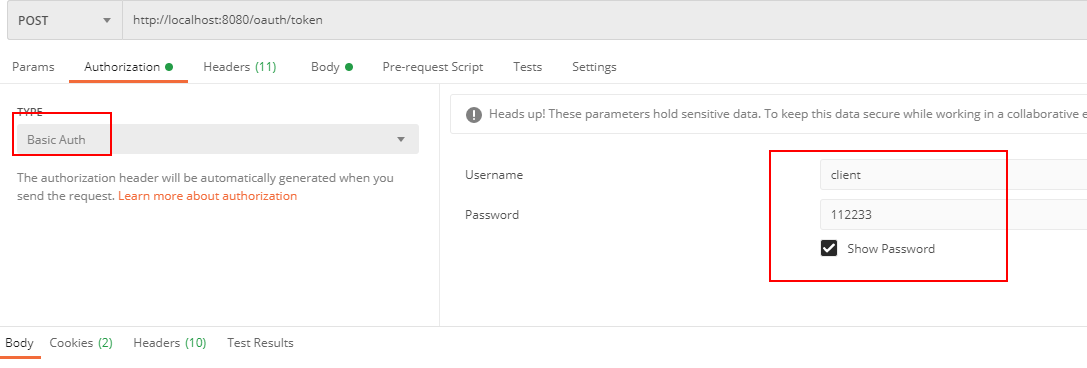
配置 Body 信息,grant_type的参数值是 authorization_code,authorization_code即为授权码模式,code即为上文获得的授权码。
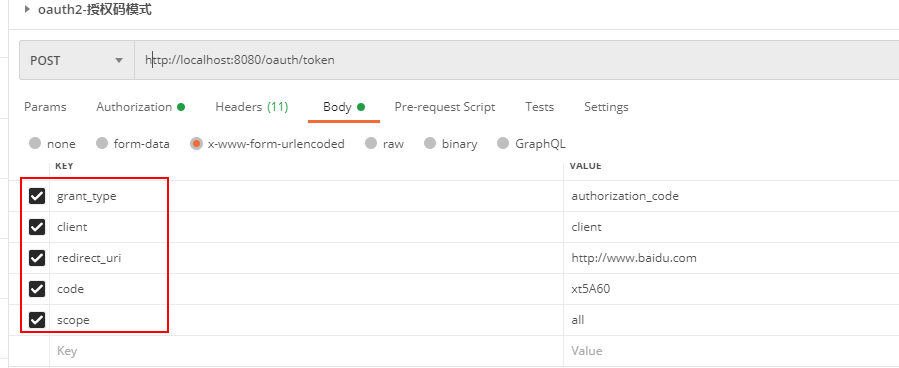
配置完后运行测试,返回 access_token和 refresh_token,看到 access_token成功转为JwtToken。

密码模式比授权码模式简单一点,不需要获得授权码,直接忽略上文获取授权码的操作,只需稍微改动配置信息。
Authorization 信息无需改动,修改 Body 信息, grant_type的参数值改为 password,代表密码模式,填写登录 spring security 的账号和密码。
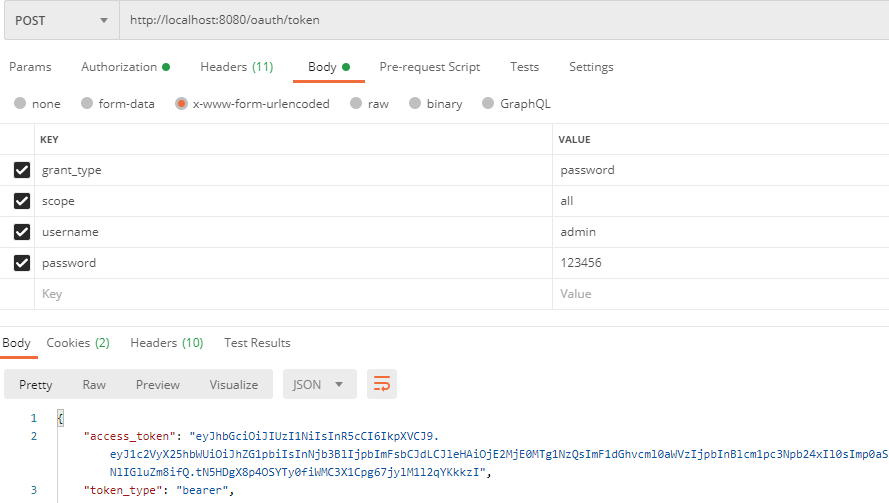
在上文中我设置了 access_token的时效性为60秒,当access_token失效时,需要根据refresh_token获取新的令牌。
访问路径如下:
Authorization 配置信息如下:

Body 需要配置 grant_type的参数值为 refresh_token,代表刷新令牌,并填写refresh_token的参数值。访问后即可获得新的 access_token。
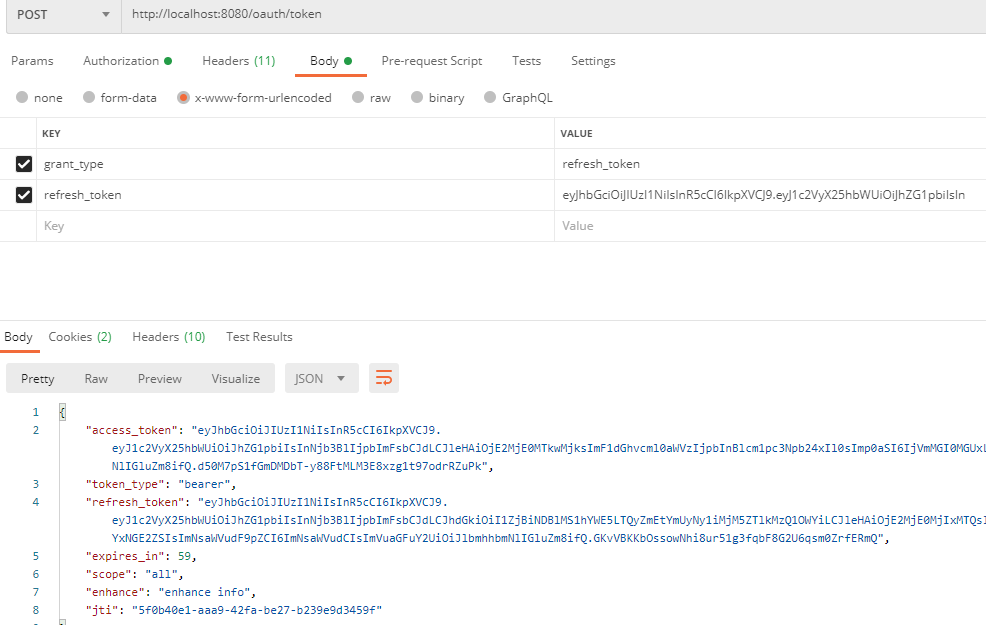
access_token获得资源访问路径如下:
Header 请求头添加 Authorization 参数,并设置参数值为 bearer+空格+ access_token,即可获得接口返回值。
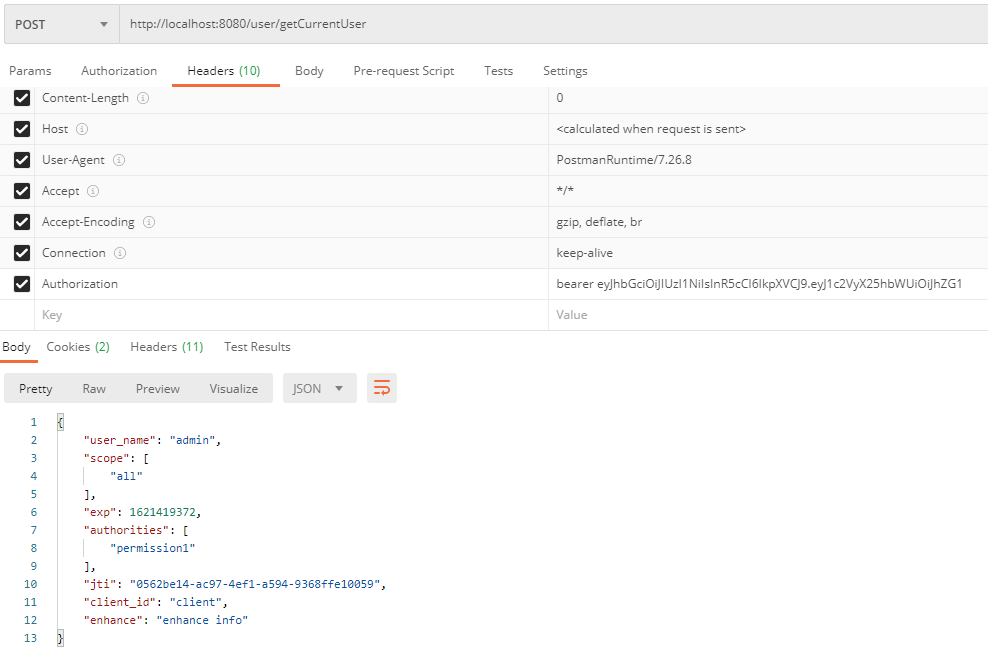
Spring Security + OAuth2 + JWT 基本使用
原文:https://www.cnblogs.com/CF1314/p/14786321.html